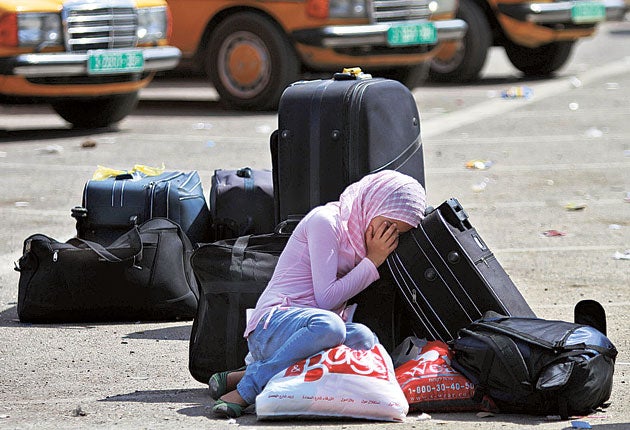'We have been trying to get out of Gaza for two years'
Donald Macintyre visits the Rafah crossing reopened by Egypt after the flotilla attack

Zahra Puhisi sat with her sick and elderly mother in the cool and quarter-full departures hall on the Palestinian side of the Rafah crossing and wondered how long it would be before a Hamas official would allocate them seats on the bus to take them across the border.
"I will only believe it when I am in Cairo," she said. "Because I live in Gaza I never believe in anything until I can touch and feel it."
They had waited in vain throughout the previous day to be among hundreds who have crossed over on each of the nine days since Egypt announced it was opening the border.
Ms Puhisi, a government zoologist from Deir el Balah, was anxious to take her mother, who has painfully swollen legs and wrists, to the Egyptian doctor who had treated her successfully when times were easier.
She had had to go first to the [Hamas] Ministry of Health to get the trip approved as medically necessary, then to the Ministry of Interior to get an exit permit, and then wait for the authorisation from Egypt.
"We have been trying to do this for two years," she explained. "First I blame Israel [for the closure of Gaza], but there are also many parties who are responsible for this problem for all the Palestinian people."
Although Egypt opened the crossing in the wake of the lethal Israeli commando raid on a pro-Palestinian flotilla last week, apparently to escape some of the blame for the closure, it has restricted passage mainly to students with visas to study abroad, serious medical cases, and those with foreign residency or passports.
One of Gaza's leading paediatricians, Dr Adnan al Wahaidi, who has an international reputation, planned to escort his Egyptian wife and their two daughters to see his ailing and elderly mother-in-law in Cairo, but was obliged by two bad-tempered uniformed security guards to wait in the heat with scores of other hopefuls outside the terminal's gates for three hours.
"We did it, we did it," exclaimed his older daughter Hind, 17, as they finally arrived at the departures hall. "I am so looking forward to seeing my grandmother for the first time since I was 11, and all my other relatives." And to get out of Gaza for a breather? "You said it. Really."
Dr Wahaidi said he had lobbied Egyptian colleagues to help him obtain an entry permit, and pointed out that he had missed six international medical conferences as far afield as the US and Peru in as many years because of the closure. Critical of Western governments for not doing more to ease the blockade, Dr Wahaidi was glad the flotilla raid had focused international attention on it, but added: "I am afraid that the World Cup will now make the Palestinian problems from the siege less prominent in the media."
Mohammed Al Masri, 42, an engineer from Beit Hanoun hoping to see his brother in China for the first time in 12 years, was impatient with Palestinian bureaucracy. "I've been here since 2am and I paid an 80 shekel fare every day to get here for five days," he said.
But a more serious charge was levelled by one family at middlemen in Egypt and their agents. Rihan Talal, 21, a student desperate to get back to Southern Illinois state university, said he and his uncle had refused an offer from someone who said he could get an entry permit from Egypt for between $2,000 and $3,000. "I am paying enough for my education already," he said.
Asked about this, Ghazi Hamad, the senior Hamas civilian overseeing the crossings, said: "I have no comment. You should ask the Egyptians."
He added that Hamas officials would not take "one shekel" from would-be travellers. "It is against our morality, our ethics."
Mr Hamad said he was sorry that travel was still restricted, and added: "I want all people to cross the border freely. I want all the crossings open." He had yet to have official confirmation that Egypt would keep the Rafah crossing open permanently.
But at least one woman returning from Egypt – where her daughter had got married to a Palestinian without ID and therefore was unable to reach Gaza – was unimpressed with her travels. "I want to kiss the ground," said Feryal al Sinwa, 48. "There is nothing better than Gaza. Despite the blockade, despite the siege, Gaza is better than anywhere in the world."
Join our commenting forum
Join thought-provoking conversations, follow other Independent readers and see their replies
Comments